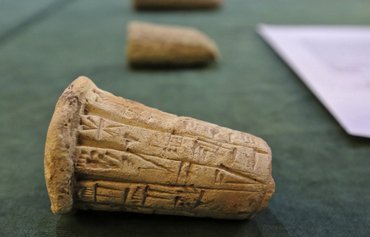An "Islamic State of Iraq and the Levant" (ISIL) threat to demolish Egypt's pyramids is merely a ploy to distract from its losses, experts tell Al-Shorfa.
The threat, issued in a video posted online in early June, comes as the group faces severe setbacks in Syria and Iraq, they said, shrinking the size of the area it controls and pushing it to engage in a new propaganda campaign.
In the video, which shows a massive explosion, ISIL claims to have demolished the 2,800-year-old temple of Nabu in the Nimrud archaeological site in Iraq (ancient Kalhu).
Later that month, the UN training and research agency (UNITAR) said it had compared a set of satellite images collected June 3rd against an earlier set, and had observed extensive damage to the temple's main entrance.
In the video, an ISIL element named as Abu Nasser al-Ansari threatens to blow up "archaeological sites built by infidels", including the pyramids of Giza.
"We believe it is our religious duty to destroy the Egyptian pyramids and Sphinx," he says on camera.
An 'unrealistic threat'
In a June 10th statement, Egypt's Dar al-Ifta Fatwa Observatory said ISIL's threats are "unrealistic and aim primarily to hurt tourism activity in the country".
The observatory credited "the success of recent security strikes in thwarting terrorist attacks and drying up many of the sources of terrorism".
"The threat made by ISIL or any other terrorist group to blow up the pyramids is nothing but empty talk, as that is impossible to happen from the security and military standpoints," said Col. Mahmoud Salem of the Cairo Province Police.
The pyramids of Giza and those at Saqqara are fully secured by Egyptian security forces, which have permanent posts that guard them around the clock, he told Al-Shorfa.
"Bombing the pyramids in order to totally or partially demolish them requires an enormous amount of explosives that must be placed in a geometric pattern that will be a near-miracle [to achieve] because of the geometric method used in building the pyramids," he said.
Salem said the main archaeological sites in Egypt, particularly popular tourist destinations, are equipped with surveillance cameras and weapon and explosives detection devices.
They also are guarded by special counter-terrorism squads and K-9 units with police dogs trained to sniff out explosives, he said.
ISIL's threat is merely "an attempt by the terrorist group to hobble Egypt's economy by giving the impression that danger lurks at archaeological sites in order to intimidate and discourage foreign tourists from visiting Egypt", he said.
'A new chapter of ISIL propaganda'
"This is not the first time that those who espouse takfiri ideas threaten to demolish the pyramids in Egypt," said former jihadist Sheikh Nabil Naim, who was a founding member of the Islamic Jihad in Egypt.
"The threat is only a new chapter in ISIL propaganda, whose only aim is to rouse its supporters and turn their attention away from the losses it is suffering in Syria and Iraq," he told Al-Shorfa.
ISIL’s demolition of antiquities or its threats to do so have no basis in sharia, he said, noting that there is no record in Islamic history or the era of conquests of the Prophet’s companions destroying antiquities in the lands they conquered.
This did not occur in the Levant, Africa or Europe, Naim said, and the proof is that the important antiquities still exist to this day.
"ISIL uses its fatwas and distorted hadith as a basis for its calls for the demolition of antiquities," Sheikh Rajeh Sabri of the Ministry of Awqaf (religious endowments) told Al-Shorfa.
The group has previously demolished many important archaeological sites in Iraq and Syria, he said, but in some cases, the demolitions were merely staged to give the impression that the antiquities had been destroyed.
There is ample evidence that the group smuggled those antiquities to be sold on the black market, he said, and was treating them as a source of revenue.
Egyptian forces take any threat to harm the pyramids and sphinx very seriously, he said, "not out of fear that they would be destroyed by the group [...] but to prevent weak-minded individuals who have been brain-washed with the group’s ideas from carrying out random acts of vandalism against archaeological sites".
ISIL has "only destroyed or stolen antiquities in the areas under its control in the past", he noted, "and it is impossible for it to reach the archaeological sites in Egypt in view of the military cordon imposed by the Egyptian army".

![In a June 10th video, an 'Islamic State of Iraq and the Levant' element threatens to destroy the Pyramids of Giza. [Waleed Abu al-Khair/Al-Shorfa]](/cnmi_am/images/2016/07/18/5844-Egypt-giza-pyramids-600_384.jpg)




